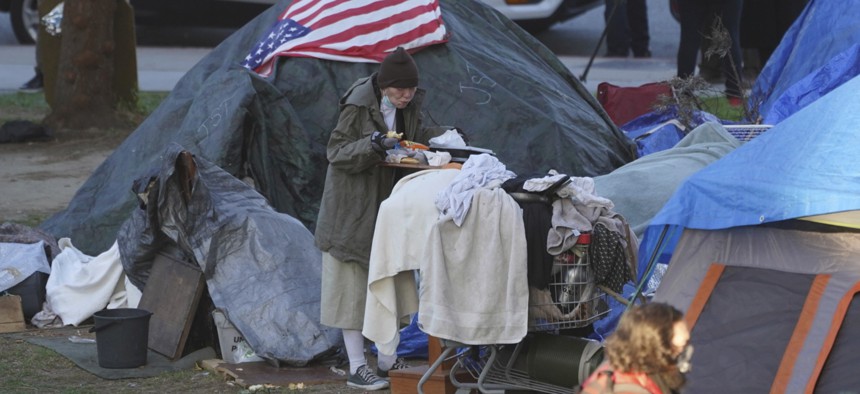HUD Prepares to Distribute $5 Billion to Help With Homelessness

In this March 24, 2021, file photo a woman eats at her tent at the Echo Park homeless encampment at Echo Park Lake in Los Angeles. AP Photo/Damian Dovarganes, File
The department released figures Thursday for how much individual states and localities will get from the pot of grant funding, part of the recent federal coronavirus relief package.
The Department of Housing and Urban Development on Thursday released details on how nearly $5 billion in funding for affordable housing and homelessness assistance programs will be divided between dozens of state and local governments around the country.
Money for the grants, which will flow as supplemental funding under the Home Investment Partnerships Program, was included in the $1.9 trillion coronavirus relief package that President Biden signed into law last month. HUD says that 651 grantees, including states, localities and insular areas will receive the funding, which will be distributed based on a formula.
Communities can use the money to build affordable housing, or “supportive” housing—which combines housing with services that people may need. Grants could also go toward costs like purchasing and converting hotels to permanent housing units, or short-term rental assistance.
Letters will be going to grantees within the next week with more information on their allocations, a HUD official said.
Grant amounts range widely. For instance, Pine Bluff, Arkansas, with a population of about 41,000, is in line to receive roughly $820,000, while Los Angeles will get close to $100 million.
“Ending homelessness is at the top of my priority list for the Department of Housing and Urban Development. We know this is a solvable issue,” HUD Secretary Marcia Fudge said during a Zoom call with reporters on Thursday. “The reality is, I’m working in an administration where the president and vice president have made it a priority,” she added.
Fudge said resources in the most recent covid relief legislation and an earlier measure, approved in December under former President Donald Trump, would allow for putting in place as many as 30,000 new units of housing.
The deadline to use the HOME grants is not until 2030 and Fudge and other officials emphasized that the funding is meant to be flexible in terms of how states and localities can use it.
HUD will also soon issue more information on emergency housing vouchers, Fudge said.
Estimates HUD released last month show that on a single night in January 2020, about 580,400 people were homeless nationwide, up 12,751 people, or 2.2%, from 2019. An increase in unsheltered individuals, staying in places like the streets or abandoned structures, was a major factor contributing to the rise.
Steve Berg, vice president for programs and policy at the National Alliance to End Homelessness, characterized the HOME grants as an important investment and noted for context that total annual funding for the federal Homeless Assistance program—a bedrock account for homelessness spending—was around $3 billion in the past year.
"This is going to give communities some more money to get people off the streets and into housing. It's a good development,” he said of the pending grants during an interview. “It's not everything we need, but it's definitely a significant chunk of money.”
Berg pointed out that homelessness was a pressing issue in many communities even before the coronavirus upended major parts of the economy last year, causing additional financial strain for many families. “We've gone through a period of rapidly rising rents and that leads to more people being homeless and it certainly did in a lot of places,” he said.
Fudge noted that in addition to the funding to address homelessness in the Covid-19 relief law, there are housing investments in a package Biden unveiled last week that would devote upwards of $2 trillion to infrastructure and other domestic priorities.
“Housing is infrastructure,” Ohio U.S. Sen. Sherrod Brown, a Democrat, who chairs the Senate Banking, Housing and Urban Affairs Committee, said during Thursday’s call.
Fudge also stressed in her remarks that the administration’s goal is not to get more people into shelters, but rather into sustainable housing arrangements. “Shelters are not our answer,” she said. “We want to take people out of shelters and put them in stable, permanent housing. So we're hopeful that the shelters are going to go away.”
Berg said that, in his group’s view, the best use of the new grant funding is to get people who are homeless into apartments.
“The money is definitely very useful for that,” he said, adding that it can be used to acquire buildings. “I think it’s got great potential,” he added. He highlighted how California has purchased hotels that are no longer economically viable and turned them into housing units.
Berg agreed with Fudge’s assessment that homelessness is solvable. But he added: “To solve it is going to take investments that are more than what we’ve been investing.”
Bill Lucia is a senior editor for Route Fifty and is based in Olympia, Washington.
NEXT STORY: Survey: 45% of Parents Want More Options Than College for Their Children






